Trip Details
This page is a collection of the planning & preparatory information that was disseminated before the short-term mission trip to Bolivia occurred. For pictures and reports of the actual trip experience, please visit the Trip Highlights page.
Destination: Tarija
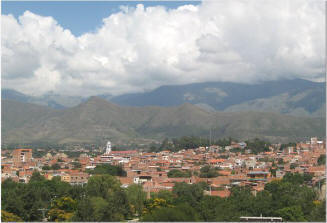
Photo courtesy of Michael Lapham
Tarija welcomes visitors warmly, calling itself La Capital de la Sonrisa (The Capital of Smiles), to an agricultural area well suited for grape and wine production. Founded in 1576, it still centers on a pleasant, traditional plaza. Other attractions include several parks, waterfalls, caves, and the world-renowned Paleontology Museum of Tarija City.
Tarija is the 7th largest city in Bolivia with about 170,000 inhabitants, and also the name of the 6th largest department (state) with a population of 470,000.
These links give a preview of what the area has to offer:
- Wikipedia article
- http://boliviaweb.com/cities/tarija.htmBoliviaWeb page
- Brief travel report and pictures at GLOBOsapiens.net
All team members are asked to meet on ??, ?? ?? between ??:00 a.m. and ??:00 p.m. local time at the airport in ?? (airport code ??). The HfH staff coordinator will meet us at the airport. We ask team members to wear the Global Village t-shirt they will receive from HFHI to ease finding each other.
Usually our first stop will be to a bank or foreign exchange house at or near the airport to obtain some local currency before heading to our lodging facility.
This map Expedia map shows Tarija along the southern border with Argentina, but you can zoom in or out for additional perspective.
Construction of Habitat houses in Bolivia
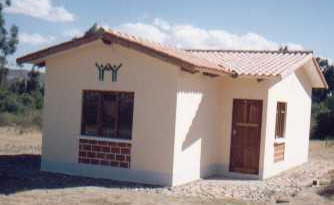
Photo courtesy of HFH - Bolivia
We will fill in additional details about construction as they become available.
The average Habitat for Humanity house in Bolivia ranges from 527 to 646 square feet (49 to 60 square meters) including 2 or 3 bedrooms, a living room, a dining room, a kitchen and a bathroom. Houses are built of steel-reinforced brick with cement floors and ceramic tile roofs, and feature electricity, water, and sewer systems. The average cost of the houses is $4,240 USD.
A primary goal is to work side-by-side with partner families and other local volunteers. Please be aware, however, that most people have to work at their jobs every day, and some might live quite a distance from the site. Although they generally can not be with us all the time, we hope that they will be able to join us when they can. This is why we always ask that the schedule includes working on Saturdays.
Please review our What To Expect page for a more complete picture of the entire experience.
Affiliate Development
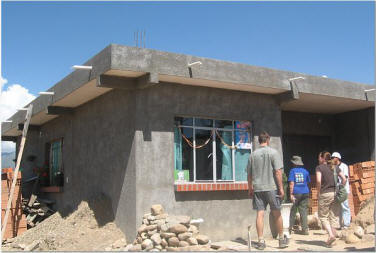
Photo courtesy of Michael Lapham
In addition to construction work, we have offered our help with advocacy and PR efforts. We hope to learn more specifics soon about the feasibility, but initial thoughts include meeting community leaders and helping to recruit local donors, families & volunteers. This will primarily be a Sunday and/or evening activity, although we will welcome the chance to "be seen" and interact to people even as we walk or ride to/from the site each day.
The affiliate has been told that we may be able to garner some extra resources through our fundraising efforts. They noted the need for tools, and would be most appreciative if we can help them out in this manner. We will wait and purchase exactly what may be needed locally rather than try to carry tools or supplies from home.
Climate & Weather
Based on this summary from WordTravels.com, Bolivia as a whole enjoys fairly moderate weather the year-round:
Due to the altitude, the climate in Bolivia is fairly temperate with cold nights and warm days. Temperatures get down to freezing on winter nights. Rain is likely over the summer months (November to March).
More significant to our mission, Wikipedia indicates that Tarija is among the most comfortable parts of the country:
[Tarija's] climate is Mediterranean (similar to the Bolivian cities of Cochabamba and Sucre), in contrast to the harsh cold of the Altiplano (i.e., La Paz) and humid heat of the Amazon Basin (i.e., Santa Cruz de la Sierra).
Here are the current conditions at Weather Underground or you can look at a summary of the conditions last February.
Accommodations
We will probably be staying in a church, retreat center or small hotel that provides clean, simple, safe, inexpensive housing. We hope to be located within easy walking distance of both the construction site and some shops where we can obtain convenience items.
Typically each room accommodates two people and has a private bathroom, though it is possible that we will have dormitory style accommodations. We don't expect air conditioning, which is actually quite a benefit as we acclimate to working in the heat. You'll be amazed at how "cool" a 73 degree morning can feels when you work the rest of the day in the hot sun!
To help safeguard our passports and valuables, we will bring a hard-sided suitcase with a bicycle cable and padlock so we can secure them in our room or the office.
Our meals will be from a variety of sources, all prepared with clean water and under sanitary conditions appropriate for our "gringo" stomachs. Typically breakfast and dinner are provided at the lodging facility. We hope that lunch will be eaten on the work site together with any family members, staff, and other volunteers present at the time. Dinner will likely be either at the lodging facility, or else we will go to one or two local restaurants. Although we always make "advance reservations", don't get your hopes up for anything but the simplest of fare!
If you haven't already done so, please review our What To Expect page for a more complete picture of the entire experience.
R&R
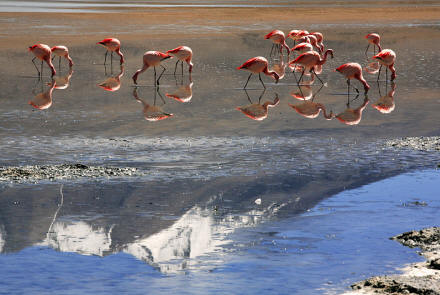
Photo courtesy of András Janscik
Balancing our building and advocacy work will be some R&R time to further explore the culture.
- Sundays will be a time to experience local church service and spend an afternoon getting to know the area markets, museums, etc. Hopefully some homebuyer families and/or other volunteers will be along so we can get to know more about them, their jobs, etc.
- We hope to learn a bit about local music, dance, crafts and customs in the evenings. A perennial favorite that we hope can be arranged is a cooking "class" to learn about Bolivian food preparation -- and maybe even a reciprocal where we provide them with a taste of our own specialties!
- We will attempt to arrange a simple sporting event like soccer with the families, staff and local volunteers as another way to help everyone get to know and feel comfortable with each other.
- After the conclusion of our work, we will take a day in Tarija and two days in La Paz to explore some culturally significant attractions and/or tourist attractions of Bolivia.
- Optionally, Dave & Susi invite you to join them on an extended tour of the Amazon and Lake Titicaca after the conclusion of our regular mission trip.
Pricing Information
Although the actual cost of the trip will not be finalized until we know exactly how many people join the team, we believe following guidelines to be reasonably close. The total price is likely to be about $1,600 to $2,000 per person plus round trip airfare. For people from Columbus, we expect flights to cost about $800 for a grand total of $2,400 to $2,800 each.
Description |
Amount |
Payable To |
| Round trip airfare. Although we will negotiate a package through http://www.twinhorizonstravel.comTwin Horizons Travel, you are free to make your own arrangements. Be sure to buy trip insurance for flexibility. | $750 to $850 | GV Team or travel agent |
| Building days food, lodging, ground transportation and activities | $640 | HFHI |
| R&R days food, lodging, ground transportation and activities | $260 | HFHI |
| Travel health insurance | $51 | HFHI |
| Donation to Habitat for Humanity International to support the Global Village program | $100 | HFHI |
| Donation to HfH Bolivia for house materials | $350 | HFHI |
| Columbus GV Team administration & First Aid Kits | $35 | HFHI |
| Contingency | 10% | HFHI |
| Special donation for tools and host country support | Optional | HFHI |
| Immunizations and malaria tablets | $0 to $275 | Others |
| U.S. Passport (renewal required if expiration is earlier than Feb 1, 2008) | $100 | Others |
| Bolivia visa, departure tax payable at airport, etc. | TBD | Others |
Read about Tax Deductions and the Cancellation Policy here.
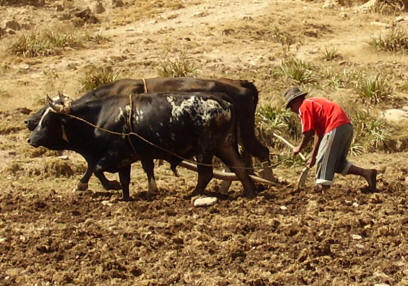
Photo courtesy of Eduardo Valdivia
Health & Safety Information
Fortunately, we are traveling to a relatively safe area. Nonetheless, it is prudent to be aware of some standard precautions that apply to all of our trips. If, after reading the standard precautions, you wish to visit the Centers of Disease Control site, click here to jump to the Bolivia page.

 Who
Who